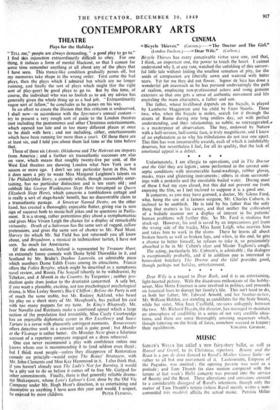CONTEMPORARY ARTS
THEATRE
Plays for the Holidays " TELL me," people are always demanding, " a good play to go to." I find this injunction extraordinarily difficult to obey. For one thing, it induces a form of mental blackout, so that I cannot for some time remember anything at all about any of the plays that I have seen. This trance-like condition gradually passes off, but my memories take shape in the wrong order. First come the bad plays, then the plays which I admired but which are no longer running, and finally the sort of plays which might (for the right sort of play-goer) be good plays to go to. But by this time, of course, the individual who was so foolish as to ask my advice has generally given the whole thing up as a bad job. " Extraordinarily vague sort of fellow," he concludes as he passes on his way.
In an effort to create the illusion that this criticism is undeserved, I shall now—in accordance with the Spectator's annual custom—
try to present a very rough sort of guide to the London theatres (not including the pantomimes and other Christmas entertainments, which opened too late and in too many different places at once to be dealt with here ; and not including, either, entertainments which have been running for more than a year). Of these there are at least six, and 1 told you about them last time or the time before that.
Three of these six (Annie, Oklahoma and The Heiress) are imports from America ; and a further six transatlantic successes are also
on view, which means that roughly twenty-five per cent. of the West End theatres are showing London what New York saw a season or more ago. I don't see any particular harm in this, but it does seem a pity to waste Miss Margaret Leighton's talents on
The Philadelphia Story, a comedy which, though reasonably enter- taining, has no particular distinction and is ten years old ; and rubbish like George Washington Slept Here (revamped as Queen Elizabeth Slept Here), which concerns a tumbledown cottage and is really a sort of stage-hands' benefit, has no discoverable claim to a transatlantic passage. A Streetcar Named Desire. on the other
hand, has created a thoroughly enjoyable flutter, giving rise (a sure sign of success) both to music-hall jokes and to questions in Parlia- ment. It is a strong, rather pretentious play about a nymphomaniac
and gives Miss Vivien Leigh the chance for a display of remarkable virtuosity. Death of a Salesman has the same sort of rugged, callow pretensions, and gives the same sort of chance to Mr. Paul Muni. Harvey (to which Mr. Sid Field has just returned) you all know about, and Brigadoon, a musical in technicolour tartan, 1 have not seen. So much for Americana.
Of the other nations, Ireland is represented by Treasure Hunt, an extremely funny comedy with Dame Sybil Thorndike in it, and Scotland by Mr. Bridle's Daphne Laureola, an admirable piece which numbers Dame Edith Evans among its attractions. France offers the Folies Bergere, which might be described as a sumptuous navel review, and Russia The Seagull (shortly to be withdrawn), by Tchekov, and A Month in the Country, by Turgeniev ; neither pro- duction quite does justice to the dramatist concerned. A safe bet,
if you want a plausible, exciting, not too psychological psychological
drama, is Miss Lesley Storm's Black Chiffon ; Before the Party is out of much the same stable, but Mr. Rodney Ackland, who based
his play on a short story of Mr. Maugham's, has packed his cast
with too many puppets for my taste. In King's Rhapsody, Mr. Ivor Novello and Ruritania make a combined appeal which a large
section of the population find irresistible, Miss Cicely Courtneidge
has an enjoyable diplomatic career in Her Excellency and Sauce Tartare is a revue with pleasantly astringent moments. Bonaventure offers detective work in a convent and is quite good ; but Murder at the Vicarage is rather better. On Monday Next gives a hilarious account of a repertory company engaged on a dress rehearsal. One can never recommend a play with confidence unless one knows whom one is recommending it to (and seldom even thcn); but I think most people—unless they disapprove of Restoration comedy on principle—would enjoy The Beaux' Stratagem, with Mr. John Clements and Miss Kay Hammond in it. I also think that, if you haven't already seen The Lady's Not for Burning. it would be a pity not to do so before it comes off to free Mr. Gielgud for other commitments. Finally, there is that generally reliable drama- tist Shakespeare, whose Love's Labour's Lost, done by the Old Vic Company under Mr. Hugh Hunt's direction, is as entertaining and decorative as anything I have seen this year and would, I suspect, be enjoyed by most children. PETER FLEMING.






























 Previous page
Previous page